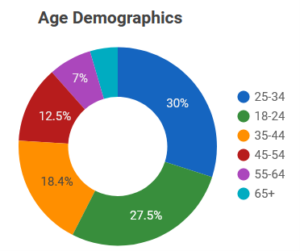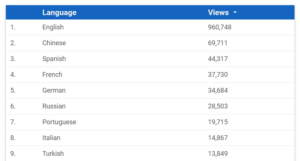At the Kluwer Arbitration Blog, December is the month to thank our readers and collaborators for their readership, contributions, and support. This is also one of the occasions in which we highlight and we praise our excellent editors.
The Kluwer Arbitration Blog will celebrate 15 years of existence in 2024. On 28 January 2009, the first post was published, announcing the creation of the Kluwer Arbitration Blog, under the editorial guidance of Prof. Roger Alford, and with several permanent contributors, including Gary Born and Martin Hunter. At the outset, Gwen de Vries, Director Content and Market Development, Wolters Kluwer Legal & Regulatory, on behalf of the publisher, indicated that:
… the blog should include frequent, high quality discussions on international arbitration in its broadest sense, thus including private and public arbitration. We specifically did not want to talk shop or to gossip. And although we always love to hear of the dealings and experiences of the established group of arbitration specialists, we also wanted the blog to offer a forum for “new” voices with diverse backgrounds.
I joined the Kluwer Arbitration Blog in May 2012, at that time with Prof. Roger Alford as Managing Editor, and with Annalise Nelson, now an attorney at the U.S. Department of State, as assistant editor. Monique Sasson joined us shortly after. In early 2013, we started developing the idea of expanding the regional coverage of the Blog, and creating the Editorial Board structure we have today, with associate editors, senior assistant editors, and assistant editors. The Editorial Board quickly expanded from 2 to over 40 members, showcasing the generous diversity and excellence of the arbitration community. The number of posts went up exponentially, from about three per week in the first three years, to at least one post per day in the past seven years. The Blog went from a little over 8,000 readers/month in January 2010 to over 150,000 readers/month since January 2020, from every corner of the world, from the United States, to India, to Cuba, Gambia, Iceland, Bahamas, Mongolia, Algeria, Singapore, Hong Kong, Canada, Brazil, St. Kitts and Nevis, Andorra, and El Salvador.

This year we would like to share with you the age and language diversity of the readership.

At the Kluwer Arbitration Blog, we are very much aware of the impact that the Blog has in disseminating local, regional, and international developments in arbitration, not only raising awareness of the advantages, but also of the disadvantages of arbitration, as a dispute resolution mechanism. Kluwer Arbitration Blog posts are cited in party submissions in investment arbitrations (see EDF International S.A. v Argentina and Gabriel Resources Ltd. v. Romania); in party submissions before courts (see U.S. Supreme Court proceedings concerning Belize v. BCB Holdings); and by arbitral tribunals and annulment committees (see Renco v. Peru, Pezold v. Zimbabwe, Caratube v. Kazakhstan, and Philip Morris v. Australia). Furthermore, the Kluwer Arbitration Blog is proud to continue its mission, as mentioned in the very first Blog post, of being “a forum for ‘new’ voices with diverse backgrounds,” and to continue to be a resource that is free of charge, with posts being reviewed extensively by the Editorial Board before publication. Contributors often acknowledge the constructive feedback from our Editorial Board, as well as the swift editorial review process.
With over 4,380 Blog posts published in almost 15 years of existence of the Blog, the diversity of topics and perspectives is impressive and constantly present, from posts authored by established arbitration practitioners to those authored by students aspiring to a career in arbitration. Readers may want to go back to the early years of the Blog and read the excellent posts of Alexis Mourre (see for example, Conflicts of Interest: Towards Greater Transparency and Uniform Standards of Disclosure?), Jan Paulsson (begin with Are Unilateral Appointments Defensible?), Laurent Lévy’s Jura Novit Curia? The Arbitrator’s Discretion in the Application of the Governing Law, Audley Sheppard’s Arbitration of International Financial Disputes, Lucy Reed’s posts (begin with the one on U.S. Discovery in Aid of International Arbitration: Recent Developments), Charles H. Brower II’s Investment Treaties in Times of Crisis: Balancing National Interests and the Rule of Law, Loukas Mistelis’ Is Arbitration Changing?, Jack Coe’s The Curious Case of Manifest Disregard [of the Law], any of Michael McIlwrath’s Anti-Arbitration and Quiz series, Gary Born’s discussion on A Code of Conduct for Counsel in International Arbitration, Julian Lew’s thoughts on The Development of International Arbitration as a Mechanism For Determining International Business Disputes, Maxi Schrerer on The Effects of Insolvency on International Arbitration, Ank Santens’ critical discussion on Costs in International Arbitration: A Plea for a Debate on Early Guidance by the Arbitral Tribunal on the Principles it Will Apply when Deciding on Costs, and many other — still timely — discussions by our contributors. If you still have some time to spare, you might want to read the first (and probably the only) post authored by an arbitral tribunal and the parties (Klaus Peter Berger, John Gilbert, Julian Lew, Michael McIlwrath, and David Perkins) on A Teaching Session for the Efficient Management of Technical Evidence in International Arbitration. As we are ending a very busy year for arbitration practitioners, Roger Alford’s post published in 2009 on Arbitration Conference Fatigue, may resonate with some of the readers.
At the Kluwer Arbitration Blog, January is the month when we take a step back and assess the developments in arbitration. 2023 was a very generous year, indeed. But 2024 promises a lot more: from the increased regionalism of arbitration and the rise of new arbitration institutions – see the newly established Abu Dhabi International Arbitration Centre, to the necessary updates of the existing arbitration legislation – see the expected approval of the 2024 English Arbitration Act, now before the UK Parliament – and of soft law instruments – see the expected revision of the IBA Guidelines on Conflicts of Interest in International Arbitration to be released at the beginning of 2024. Critical developments in investment arbitration are likely to continue in 2024, with the hearing in NextEra and 9REN v. Spain appeals before the U.S. Court of Appeals for the District Court of Columbia Circuit scheduled in the early days of 2024, and decisively addressing the recognition and enforcement of ICSID pecuniary arbitral awards before U.S. courts, but also with the judgment of the Court of Justice of the European Union in Case C‑516/22, European Commission v. United Kingdom of Great Britain and Northern Ireland, on the enforcement of the Micula award by the English courts. Investor-State dispute settlement (ISDS) reform continues under the auspices of UNCITRAL Working Group III, with the first reform option already adopted by the Commission on the Code of Conduct for Arbitrators and Judges. Arbitration and climate change and energy transition will continue to be the hot topic of the next years, with ICCA Panel of Experts to Develop a Paris Agreement Conciliation Annex being led by Annette Magnusson and Catherine Amirfar, as well as with the expected International Court of Justice Advisory Opinion on Obligations of States in respect of Climate Change and similar other requests before, for example, the Inter-American Court of Human Rights and the International Tribunal for the Law of the Sea.
As mentioned, this Blog post is one of the few opportunities to acknowledge and to thank our Editors. We are grateful to our Editors for their tremendous work behind each published post, for actively engaging with our arbitration community, and for maintaining the high standards of quality here at the Kluwer Arbitration Blog. Over the years, we have had exceptional editors in our team, all of them continuing to be very close to the Blog. This year, in particular, we would like to acknowledge the tremendous contribution of Esmé Shirlow, Associate Professor, the Australian National University, and of Arie Eernisse, Senior Foreign Attorney, Peter & Kim, and until this month, Associate Editors of the Kluwer Arbitration Blog. We would also like to acknowledge our new and existing Associate Editors: Kiran Nasir Gore, Maria Fanou, Hiroko Yamamoto, Khushboo Shahdadpuri, and Anne Wang, for their tremendous contributions to the Blog and for excellently coordinating the regional and subject teams of editors. The current editors, coming from diverse jurisdictions and with diverse backgrounds, always with exceptional ideas which you often see them materialized on the Blog: Dina Prokic (Senior Assistant Editor), Daniela Páez-Salgado (Senior Assistant Editor), Raoul J. Renard (Senior Assistant Editor), Titilope Sinmi-Adetona (Assistant Editor), Maria José Alarcon (Assistant Editor for Investment Arbitration), Ajoo Kim (Assistant Editor for Investment Arbitration), Hannepes Taychayev (Assistant Editor for East and Central Asia), Youlin Yuan (Assistant Editor for East and Central Asia), Yue Zhao (Assistant Editor for East and Central Asia), Deborah Loh (Assistant Editor for Southeast Asia), Shreya Jain (Assistant Editor for South Asia), Piyush Prasad (Assistant Editor for South Asia), Ashutosh Ray (Assistant Editor for South Asia), Ahmed Durrani (Assistant Editor for Afghanistan, Iran and Pakistan), Antoine Cottin (Assistant Editor for Europe), Boris Praštalo (Assistant Editor for Europe), Olga Sendetska (Assistant Editor for Europe), Eric Lenier Ives (Assistant Editor for Canada and the United States), Paige von Mehren (Assistant Editor for Canada and the United States), Aecio Filipe Oliveira (Assistant Editor for South and Central America), Fabian Zetina (Assistant Editor for South and Central America), Emma Garrett (Assistant Editor for Australia, New Zealand and the Pacific Islands), Sam Macintosh (Assistant Editor for Australia, New Zealand and the Pacific Islands), Sue Ng (Assistant Editor to the Managing Editor), Celine Yan Wang (Assistant Editor to the Managing Editor), Filippo Zuti Giachetti (Assistant Editor to the Managing Editor), Alexia Gkoritsa (Assistant Editor for Technology), David Isidore Tan (Assistant Editor for Technology), Obegi Elly (Assistant Editor for Africa), Bethel Kassa (Assistant Editor for Africa), Ibukunoluwa Owa (Assistant Editor for Africa), Yi-Jun Kang (Assistant Editor for Southeast Asia).
We are currently seeing a need for editors for MENA, Europe, Investment and Australia, New Zealand and the Pacific Islands teams, and announcement should soon follow on the Kluwer Arbitration Blog. Do share these announcements with your colleagues, or apply, if you have the passion for arbitration and if your practice focuses on the respective regions/subjects.
The Blog is also the result of the fruitful collaboration with its publisher, Wolters Kluwer, and the Editorial Board is grateful to Vincent Verschoor, editor and content manager with Wolters Kluwer, for ensuring that we deliver the best final product to our readers. We are also grateful to the permanent contributors and to the affiliates of the Blog, some being with us from the first days of the Kluwer Arbitration Blog.
At the Kluwer Arbitration Blog, we believe that the arbitration community must actively do its best to ensure the legitimacy of arbitration, as a suitable dispute resolution mechanism.
We would like to thank YOU for all your support, and we send our best wishes for the Festive Season. We wish you an excellent 2024, with peace, health, and joy!
Prof Dr Crina Baltag, Managing Editor, on behalf of the Editorial Board
________________________
To make sure you do not miss out on regular updates from the Kluwer Arbitration Blog, please subscribe here. To submit a proposal for a blog post, please consult our Editorial Guidelines.


